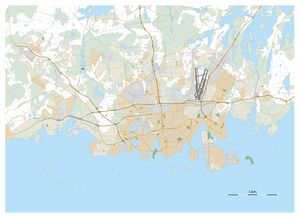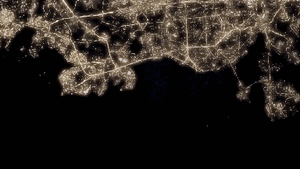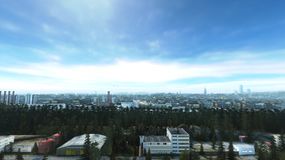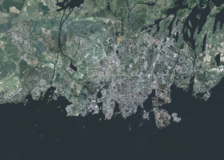Stalburg
| Capital City of Stolland | |
|---|---|
|
| |
| |
| Mayors |
Adolf Altmaier (former) |
 | |
The City of Stalburg (SB) (/stɑlbɝɡ/ stal-burg; Swedish: Stalborg; Finnish: Staalpuri) is the capital of the fictional Scandinavian country of Stolland (TSL)[1] and the Stalburg Region. Stalburg is located bordering the Baltic sea with Hanseatic and Novgorodian origins. The city has nearly two million citizens living within it.[2]
History
Early middle ages (before 1200)
Small unnamed fishing villages were located in the area of the current ‘Fishermen bay’.
Late middle ages (1200–1400)
Hanseatic league and Novgorodian traders founded Stalburg as an iron mining settlement, in the area of currently known ‘Old town’. They also constructed a small castle to protect the newly founded settlement of Stalburg. Between the 1200’s and 1400’s the settlement grew and was granted full city rights. The castle was also expanded.
Renaissance (1400–1600)
During the 1400’s, the original settlement suffered great damage during the Stalburg Fire. After the incident, the city was decided to be relocated to the current site of the city center at a bay 5km east of the original location, due to the obscure location for its port and rough, cliffed terrain. The old castle was abandoned and a new fort was built to cover the location of the new Stalburg.
Neoclassicism (1600–1800)
The city increased its growth, becoming a wealthy and important harbor and trading city in the Baltic region. Many new sea forts were built to protect the important port. INFRA: Game Design Document
Industrialization (1800–1900)
The city’s status as an important port and iron mine allowed the city to industrialize fast, boosting the city’s growth and economy even more. Many factories were constructed in districts around city limits and the coast, such as the ‘Foundry’. Railroads were also constructed.
On the flip side of the coin, the fast industrialization caused many people seeking jobs to migrate into the city faster than new apartments and tenements could be built, causing the formation of slums around the city. During that time the city also suffered some sanitation, pollution and health issues. During the late 1800’s, work started on improving the sanitation and water quality. Sewers and water pipes were built under the city - some of which still operational to this day.
Modern times (1900-)
Around the early 1900’s, to further improve the water quality (and to response the growth of the city), the city contracted Bergmann to construct water tunnel from the northern lakes. During the early 1900’s the slums were removed and replaced with proper housing.
World War II
During the Second World War, Stalburg suffered great damage from German bombings. Many people are quoted saying that "Stalburg was flattened to the ground".
Post-War
After the events of WW2, the city contracted the Bergmann Group to construct most of Stalburg's underground infrastructure. Bergmann got a great deal of help from a local company called Stalburg Steel, who supplied them with steel to aid in the construction of the vast underground tunnel networks. Another company that benefited from Bergmann was Hammer Valley Hydro, who relied on Bergmann's water tunnels to keep their two dams, Hammer Valley Dam and Two Gorges Dam, operational.
During the early 1980s, things began to go wrong in Stalburg.
The Bergmann Group went bankrupt due to the disappearance of Xeander Berg, who had plans for an invention that would change the world of construction forever; textile-reinforced concrete. Eric Kleinmann was forced to sell his company to Jeff Walter.
Next was Stalburg Steel. S.N.W wanted Stalburg Steel gone to incite civil unrest, which would cause the enforcement of Martial Law and military mandate over civilian legislative bodies, as well as bury sensitive information about S.N.W Mikhail Rosenthal acquired through his 'criminal connections'.
And finally, Hammer Valley Hydro. After the Bergmann Group was gone, no one could maintain the tunnels that Hammer Valley Hydro relied on to keep their dams operational. The CEO of Hammer Valley Hydro, Alex Hartman, after being forced to sell his company to Jeff Walter, grew furious at Walter's actions - and since then, he began searching for Walter to seek vengeance. Alex found Jeff at Rosenthal's villa in 1986, where he murdered him in cold blood.
From then on, Stalburg was never the same. Many former workers of these companies ended up in Obenseuer, a crumbling part of Stalburg to which homeless people are taken.
Corruption Scandal
Between 1979 and 1982, most of the biggest companies in Stalburg were intentionally bankrupted by the Stalburg Nuclear Weapons project. Logistics and information regarding S.N.W.'s underground bunker was kept hidden on National Consulting Group servers by their insider, Paul Lauwens.
On August 8 2016, the National Consulting Group servers were compromised by a cyberattack and the stored data was stolen by a local hacker group. NCG engineer Markku Siltanen would end up retrieving this data from the hackers' outpost in Pitheath, and upon it being released to the public a military investigation targeting the city's politicians and key companies was launched.
City Blackout

On August the 8th 2016, due to years of neglected maintenance, parts of the Bergmann freshwater tunnel system finally collapsed, in turn causing significant damage and flooding to various subterranean structures. Due to the blockage of the tunnels, an unusually high amount of pressure was put on the already derelict Two Gorges Dam, and around 20:00 the dam failed catastrophically. The resulting flood forced the evacuation of Stalburg, and ended up submerging various sites within the river valley including parts of the city itself, as well as causing major flooding at the nearby Blackrock Nuclear Power Plant. Around 22:00, the city's power supply failed completely as a result of the flooding causing a blackout across the whole city. The severe flooding in the Blackrock Nuclear Power Plant broke the remote control of the first reactor, thus the reactor had to be shut down manually by Markku Siltanen. Thanks to Mark's heroism, a nuclear meltdown was prevented, saving hundreds of thousands of people.
Fungal Disease
Main article: SMV
Government
The main decision-making organ of the Stalburg Region and the City of Stalburg municipality is the City Council, among the appointed officials are the Mayor and the Governor. During the 1980s the Mayor duties were served by Adolf Altmaier and the Governor duties were served by Gov. Defty, during 2017 the Mayor duties were served by Jean Wallin.
Departments
- Department of Health[3]
- Department of Infrastructure[4]
- Department of City Planning[5]
- Department of Construction and Planning (during 1973)[6]
- Committee of Post Inspection Decisions
- Stalburg Parking Authority[7]
- Stalburg Police Department[8]
Administrative subdivisions
The following are the divisions directly named as districts in-game or by the developers.
Central Stalburg
- Business District[11]
- Echtfjord District[12]
- Foundry District[13]
- Walter Square District[14]
- Pitheath District[14]
Outer Stalburg
- Obenseuer District
- Center district zone
- Bazaar district zone
- Center
- Slums
- Industrial Area
- Residential district zone
- Industrial district zone
- Quarantine Zone district zone
- Swamp district zone
- Mines district zone
- Turnip Hill district zone
- Whiprock District[14]
Potential districts, neighborhoods and other subdivisions
It has been confirmed by the developer that most of the districts can be figured out from the station names of the metro system.[14] However for many locations it is unclear whether they are meant to be districts, neighborhoods or any other type of subdivisions.
Central Stalburg
- Stenhill
- Melton
- Jasny
- Osmo Hill
- Southport
- Oldtown
- Firplas
Outer Stalburg
- Castle Rock
- Point Elias
- Turnip
- Cernmont
- Westport
- Eastport
- Raft Isle
- Hays Point
Transportation
Rail Transport
From Stalburg Central Railway Station there are 10 regional lines that connect to other cities and towns in Stalburg Region: R10 to Forde, R11 to Forde, R12 to Illo, R130 to Ardscratch, R15 to Tilstrand, R20 to Ersfors, R21 to Koksburg, R230 to Cellecter, R30 to Sydhavn and R330 to Ploughwedge. Stalburg has 4 metro lines that are maintained and operated by Stalburg Mass Transit. Mark will use and visit parts of the metro system during his journey. The metro system is also a way for the player to perceive the scale of the city and their movement relative to it. The metro in Stalburg is known to be poorly maintained - this causes many of it's integral parts to be unstable. In fact, Mark sees a metro train that nearly gets crushed by the tunnel behind it collapsing. This in turn causes the Public Transport Workers Union to protest on an almost weekly basis for safer working conditions. Part of the Metro network collapses as Mark is trying to traverse it, causing a collapse/cave-in into the Bergmann water tunnels below.
Road Transport
Stalburg is connected by 5 motorways: M1 (west), M2 (north-west), M3 (north), M4 (north-east) and M5 (east)[15]. Presumably, the M3 was used by Mark on his way to Hammer Valley, while part of the M2 was used after the blackout when Mark went to the Blackrock Nuclear Power Plant. We get no information in the game as to who is responsible for maintaining these motorways. Considering the lack of information we get on the roadways of Stalburg it may be implied that the road network is in better condition than the other infrastructure located in Stalburg, though multiple bridges photographed by Mark indicate that Stalburg's roadway or bridge infrastructure may be sub-par.
Air Transport
Stalburg has one airport named Stalburg International Airport (SIA). SIA has 2 runways, and is considered a medium-sized International Airport. An issue cropped-up as new metal-detectors installed at SIA caused issues for travelers.
Gallery
-
Image showcasing the terrible state of the metro tunnels in Stalburg.
-
The four metro lines in Stalburg.
-
Stalburg International Airport seen from the top of the Stalburg Steel blast furnace.
Trivia
The shape of the coastal line along Stalburg is loosely based on the real coastal shape of the Ii municipality in Finland.
References
- ↑ Oskutin: Stolland
- ↑ https://imgur.com/gallery/7xSBG
- ↑ INFRA - Health Inspection Report
- ↑ INFRA - Hammer Valley Service Keys envelope
- ↑ INFRA - Castle Rock and Point Elias city map signs
- ↑ INFRA - Obenseuer Construction Site Inspection Report answer
- ↑ INFRA - parking tickets
- ↑ INFRA - S.N.W Bunker Report
- ↑ INFRA - NTP acronym on police cars
- ↑ Obenseuer
- ↑ Developer's Commentary
- ↑ Stalburg Times - NCG Accidentally Orders Wrong Building Destroyed
- ↑ INFRA: Game Design Document
- ↑ 14.0 14.1 14.2 14.3 Developer's Commentary
- ↑ Oskutin: 1, 2, 3, 4, 5 from west to east.
| Points of interest in the Stalburg city | |
|---|---|
| Water infrastructure | Bergmann Water Tunnels • Pine Fell Water Plant • Pitheath Water Treatment Plant • Stalburg Central Water Plant |
| Energy infrastructure | Hammer Valley Dam • Two Gorges Dam • Coal-fired Power Station • Blackrock Nuclear Power Plant |
| Other | Alcista Office Complex • Stalburg Steel Mill • Stalburg International Airport • Walter Tower • Castle Rock • Obenseuer • Turnip Hill • Whiprock Island |






